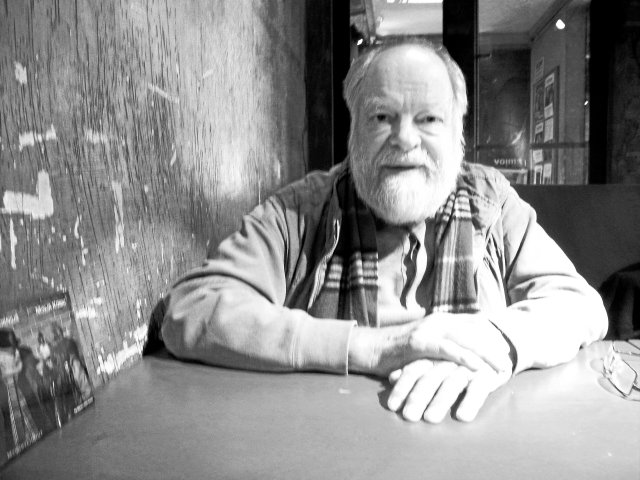Kaj Chydenius im KOM Theater Helsinki 2014
Photo: Astrid Volpert
Last Saturday, Kaj Chydenius, Finland’s most important contemporary composer, died in Helsinki at the age of 84. He created more than 3,000 songs – for soloists, groups, choirs, cabarets, over 100 theater performances and films. And in 1971 he was the co-founder and long-time director of the avant-garde theater KOM. He became known throughout Europe and especially in the GDR in the 70s and 80s through his active participation in forums about poetry and music, music and political theater on the occasion of the Berlin Brecht Dialogues and the Festival of Political Song, as well as guest performances by his theater in Berlin Holidays and at the Academy of Arts. He celebrated both his 60th and 70th birthdays with great concert evenings in the Berlin Wabe.
Chydenius vividly and passionately embodied Eisler’s dictum of “delivering”; He saw himself and his art as messengers for an audience that wanted to understand and engage with his time. The language of his music was clear, varied and expressive, although he never approached the political at the expense of imagination and artistic content.
Poets were his heroes. He was convinced that music gives wings to his verses and set to music not only works by Finnish but also international authors such as Brecht, Yevtushenko and Heine. A love poem by the Spaniard Luis de Góngora, written around 1580 and produced in 1977, is now being sung more often in Finland. It tells the story of a young woman who lost her husband because he had to go to war.
Born in Kuusankoski in 1939, he was drawn to music early on, against the advice of his father, the branch manager of a paper factory, to take up a secure career. He studied at the Helsinki Sibelius Academy and the Moscow Tchaikovsky Conservatory. Chydenius got his artistic start with avant-garde music, happenings and instrumental theater in the aesthetics of John Cage. In 1966 he founded his first stage company with fellow students and actors. They performed his anti-fascist opera “Lapua” at the student theater – an outcry against the establishment in the theater and music industry.
With the KOM Theater (the “Kom” stood for communism) he traveled through Finland in an old bus. They inspired many people in schools, cultural centers, clubs and at folk festivals, not just intellectuals. They later acquired their own venue at Kapteeninkatu 26 in Helsinki. For half a century, Chydenius alternated with his friend and director Pekka Milonoff at the helm of this successful art stage. Chydenius’ musical palette was inexhaustible. In addition to songs and vocal cycles, he composed choral works, chamber music, cantatas and oratorios. In later years he resembled little Hanns Eisler in stature and, like him, his voice and piano playing were loud and clear. His best-known songs come from the political song movement of the 1960s and 1970s. When it subsided, some of them were not left in the archive: “Nuoruus-Tango”, “Kenen joukoissa seisot”, especially “Kalliolle kukkulalle”. For Milonoff, his friend lived two maxims: Art belongs to everyone and everyone can sing – workers’ songs, student songs, solidarity songs, folk songs, chansons.
Subscribe to the “nd”
Being left is complicated.
We keep track!
With our digital promotional subscription you can read all issues of »nd« digitally (nd.App or nd.Epaper) for little money at home or on the go.
Subscribe now!
